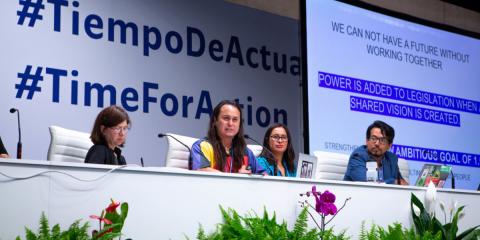
The following is a press release from CIDSE on the COP25 negotiations in Madrid. Chloe Noël of MOGC has been present in Madrid, working closely with CIDSE, a network of Catholic social justice organizations of which MOGC is a member.
Chloe Noël of MOGC has been in Madrid, Spain for the UN COP25 climate conference. Chloe (left in photo) has worked closely with CIDSE, a network of Catholic social justice and international development organizations of which MOGC is a member, to organize side events at COP25 related to the inclusion of human rights in climate agreements and on fair, inclusive policy regarding carbon markets (or Article 6 of the Paris climate agreement). The following is a press release from CIDSE on the COP25 negotiations:
In the closing week of United Nations climate change talks (COP25) in Madrid, CIDSE says human rights must be written into any new rules, otherwise the Paris Agreement will cause more harm than good. With International Human Rights Day on Tuesday 10 December, the second week of negotiations at COP25 should not beget further rights’ violations in the decades to come.
A key sticking point at COP25 are the rules about trading emission cuts through carbon markets under Article 6 of the Paris Agreement. Following the historical damage of the carbon market mechanism CDM under the Kyoto Protocol, these must be designed to guarantee the rights of affected populations. National emissions reductions must be the first priority for each country. Carbon markets should be a tool to cut emissions within the carbon budget for 1.5°C, not an opportunity to make money out of the climate emergency that’s hitting the poor the hardest.
CIDSE, together with many other civil society organisations, gave negotiators the right mix for an effective, rights-based article 6 in an outdoor stunt on Friday, with the ingredients including: robust accounting rules, gender responsiveness, human rights safeguards, environmental integrity, no carryover of projects from earlier schemes, mandatory inclusive stakeholder consultation and an independent grievance mechanism.
CIDSE and USCSAN also joined forces for a side event at COP25 highlighting the dangers of “false solutions”, and the importance of locally based and informed energy solutions to the climate emergency.
Andreia Fanzeres, Coordinator of Indigenous Peoples´ Rights for OPAN Brazil showed how even small-scale hydroelectric dams in the Amazon basin were damaging indigenous peoples’ rivers and way of life. She insisted that indigenous and local peoples should give ‘free, prior and informed consent’ and environmental impact studies should be carried out before such infrastructure projects are permitted.
Antonio Zambrano, Coordinator of Clean Energy Program for MOCICC, Peru said the systemic shift to renewable energy and human rights must go together. “We are fighting to change not just the little things, but the world itself – we are talking about an energy transition. We need a revolution right now, all over the world.”
The voices of affected peoples show that consultation is essential to any climate solution. True solutions come from the ground, from people who know the needs, the community, the landscape, and the local ecology.
The people’s voices at the conference were amplified by half a million people at the climate march on Friday evening. The CIDSE delegation in Madrid – led by young volunteers from CIDSE’s Spanish member Manos Unidas – joined the colorful, loud and united crowd calling for a radical shift to address the combined ecological, social and economic crisis.
A statement from Catholic cardinals released prior to COP25 at the Pan-Amazonian Synod, expressed concern that some countries continued to act in self-interest by seeking loopholes under carbon trading rules, without social and environmental safeguards.
Echoing Pope Francis’ message to COP25, CIDSE calls on negotiators this week to truly listen to the cry of the earth and of the poor. New policy rules must answer to science and the mobilization of young people, not private interests. The redlines they need to respect are those of human rights, equity and solidarity.
Photo credit: Liam/CAFOD
